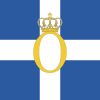Gennaios Kolokotronis

26 May – 11 October 1862
Stemnitsa, Morea Eyalet, Ottoman Empire (now Trikolonoi, Greece)
Panos Kolokotronis (brother)
Apostolis Kolokotronis (cousin)
Kitsos Tzavelas (brother-in-law)
Aikaterini Karousou
 Grand Cross of the Order of the Redeemer
Grand Cross of the Order of the Redeemer First Hellenic Republic
First Hellenic Republic Kingdom of Greece
Kingdom of Greece Hellenic Army
Hellenic ArmyIoannis Kolokotronis (Greek: Ιωάννης Κολοκοτρώνης; 1805–1868[1]), or Gennaios Kolokotronis (Greek: Γενναίος Κολοκοτρώνης) as he was nicknamed, was a Greek warrior of the Greek War of Independence, General and Prime Minister of Greece.
Biography
He was born at Stemnitsa, Arcadia, but he grew up at Zakynthos. He was a son of Theodoros Kolokotronis and his mother was Aikaterini Karousou (Greek: Αικατερίνη Καρούσου). He acquired the nickname "Gennaios" (meaning "brave") during the Greek War of Independence in which he fought valiantly despite his youth. He took part at the siege of Tripolitsa, together with his father.
During the civil wars he sided with his father.
Kolokotronis served as the aide-de-camp of King Otto with the rank of Major General, and was appointed by Otto as his last Prime Minister at 1862.
He married the sister of Kitsos Tzavelas, Photini Tzavela and together they had 2 sons and 5 daughters.
He died on 23 May 1868.

- v
- t
- e
(1822–1832)
(1833–1862)
(1862–1863)
(1863–1924)
- D. Voulgaris
- Kanaris
- Z. Valvis
- Kanaris
- Koumoundouros
- Deligeorgis
- Roufos
- D. Voulgaris
- Koumoundouros
- Deligeorgis
- Roufos
- D. Voulgaris
- Koumoundouros
- Moraitinis
- D. Voulgaris
- Thr. Zaimis
- Deligeorgis
- Koumoundouros
- Thr. Zaimis
- D. Voulgaris
- Deligeorgis
- D. Voulgaris
- Ch. Trikoupis
- Koumoundouros
- Deligeorgis
- Koumoundouros
- Deligeorgis
- Koumoundouros
- Kanaris
- Koumoundouros
- Ch. Trikoupis
- Koumoundouros
- Ch. Trikoupis
- Koumoundouros
- Ch. Trikoupis
- Diligiannis
- D. Valvis
- Ch. Trikoupis
- Diligiannis
- Konstantopoulos
- Ch. Trikoupis
- Sotiropoulos
- Ch. Trikoupis
- Deligiannis
- Diligiannis
- D. Rallis
- Al. Zaimis
- G. Theotokis
- Al. Zaimis
- Diligiannis
- G. Theotokis
- D. Rallis
- G. Theotokis
- Diligiannis
- D. Rallis
- G. Theotokis
- D. Rallis
- K. Mavromichalis
- Dragoumis
- El. Venizelos
- Gounaris
- El. Venizelos
- Al. Zaimis
- Skouloudis
- Al. Zaimis
- Kalogeropoulos
- El. Venizelos2
- Lambros
- Al. Zaimis
- El. Venizelos
- D. Rallis
- Kalogeropoulos
- Gounaris
- Stratos
- Protopapadakis
- Triantafyllakos
- Charalambis
- Krokidas
- Gonatas
- El. Venizelos
- Kafantaris
(1924–1935)
(1935–1973)
- Kondylis1
- Demertzis
- I. Metaxas1
- Koryzis
- Tsouderos2
- Tsolakoglou4
- Logothetopoulos4
- I. Rallis4
- Bakirtzis2
- S. Venizelos2
- Svolos2
- G. Papandreou (Sr.)
- Plastiras
- P. Voulgaris
- Archbishop Damaskinos
- Kanellopoulos
- Sofoulis
- Poulitsas3
- K. Tsaldaris
- Maximos
- K. Tsaldaris
- Sofoulis
- Vafeiadis2
- Partsalidis2
- Diomidis
- I. Theotokis3
- S. Venizelos
- Plastiras
- S. Venizelos
- Plastiras
- Kiousopoulos3
- Papagos
- K. Karamanlis (Sr.)
- Georgakopoulos3
- K. Karamanlis (Sr.)
- Dovas3
- K. Karamanlis (Sr.)
- Pipinelis
- Sty. Mavromichalis3
- G. Papandreou (Sr.)
- Paraskevopoulos3
- G. Papandreou (Sr.)
- Novas
- Tsirimokos
- Stefanopoulos
- Paraskevopoulos3
- Kanellopoulos3
(1967–1974)
(since 1974)
 | This biographical article related to the military of Greece is a stub. You can help Wikipedia by expanding it. |
- v
- t
- e
- ^ Note: Greece officially adopted the Gregorian calendar on 16 February 1923 (which became 1 March). All dates prior to that, unless specifically denoted, are Old Style.












